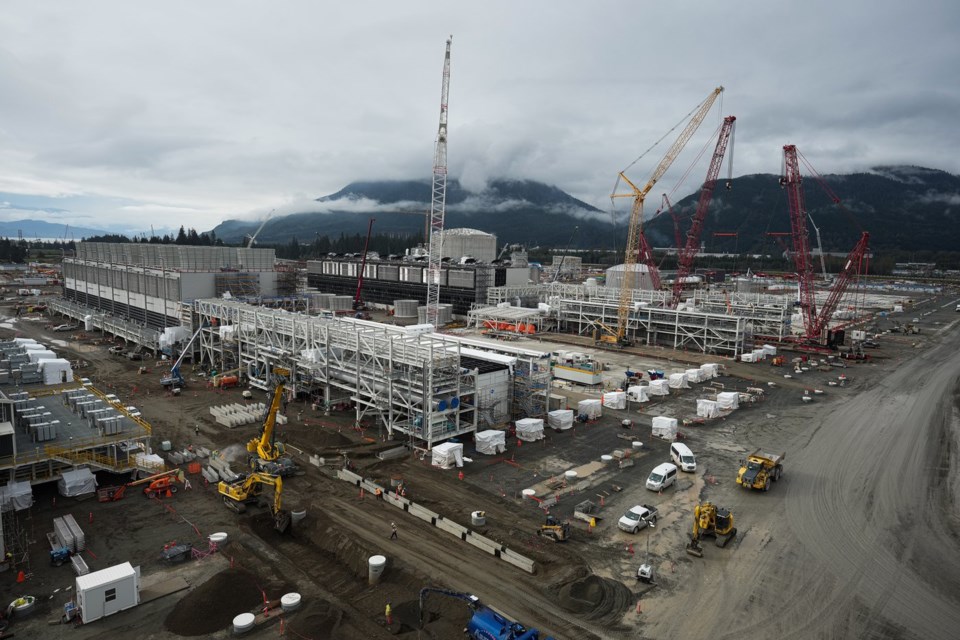The chief executive of pipeline operator TC Energy says he believes Canada can be the No. 1 exporter of liquefied natural gas to Asia, but political leadership is crucial to making it happen.
"We have the supply, we have a transportation cost advantage and the demand is there for the taking," François Poirier said in a speech Thursday to Canadian Club Toronto.
"Our leaders need to unite on this ambition and show the world that Canada is back in business."
Liquefied natural gas, or LNG, is gas that has been chilled into a liquid state, enabling it to be transported overseas in specialized tankers. Gas produced in Western Canada could sell for a much higher price in Asia than if it were to remain landlocked, and advocates say securing new buyers would reduce Canada's reliance on the United States.
The initial phase of Canada's first LNG export terminal is set to start up mid-year in Kitimat, B.C. LNG Canada said last week that a ship carrying imported natural gas arrived at the facility for equipment testing.
TC Energy built the pipeline, Coastal GasLink, that ships natural gas across B.C. to Kitimat.
Poirier said for Canada to be a global LNG leader, it will take political will as well as "big and bold" thinking.
"Fifteen years ago, Canada was at the starting blocks with the U.S. in pursuing LNG exports. At one point, Canada had 18 proposed LNG projects off the West Coast of Canada," he said.
"We had the opportunity then to be No. 1 and now we're playing catch up. Canada today is commissioning its first LNG facility, while the U.S., well, they've become the largest exporter in the world."
Canada currently sends virtually all of its natural gas exports to the United States. The trade relationship between the two countries has been rattled by U.S. President Donald Trump's evolving tariffs and musings about annexing Canada.
Poirier is also calling for "hands-on political management" to ensure projects are built on time and on budget. He said whichever party wins the April 28 federal election should ask business leaders for a list of priority projects that government, industry and Indigenous leaders can work together to build with a sense of urgency.
He added that policy certainty over project approval timelines is paramount if Canada is to compete for investment — it can take a decade for projects to come to fruition in this country.
"We risk ceding market share to our competitors, but more importantly we are entrusting our energy future to others and we are losing the opportunity for economic sovereignty that should be standard for a resource-rich country like Canada."
Michael Sambasivam, a senior analyst with Investors for Paris Compliance who has researched global LNG, said "outdated assumptions" underpin the common view that Asia is an enormous growth area for natural gas demand and that Canada is perfectly suited to fill it.
"The mandate of the Government of Canada should not be to push these projects forward at any cost, which seems to be … the patriotic push right now," he said.
"LNG has been painted as a bit of a money printer."
The net-zero shareholder advocacy group published a report in December that noted an overbuild of LNG globally, uncertain demand in emerging markets, high Canadian production costs and political risks.
"We're late to the game a little bit. And that late-to-the-game aspect is also going to hurt our ability to sell gas because a lot of these projects are contracted out on a multi-year basis," Sambasivam said.
"Canada is still stuck paying off capital costs on a lot of these brand new LNG projects when the height of LNG demand is likely already in the rear-view window."
TC's Poirier was one of 14 energy executives who wrote an open letter to the four main federal party leaders ahead of the election call. In it, they urged Ottawa to invoke unspecified emergency powers to speed key projects deemed in the national interest.
They called for a simplification of regulation and a commitment to firm six-month deadlines for project approvals. They also want an elimination of the federal government's cap on emissions, the repeal of the federal carbon levy on large emitters and loan guarantees to help Indigenous co-investment opportunities.
In a question-and-answer session with CIBC CEO Victor Dodig following his speech, Poirier said he wants more detail from the two parties leading in the polls.
"Saying you want pipelines to get built is polling well right now, but the reality is we are going to need a sustained level of support to build this infrastructure for five or more years," Poirier said.
The Conservatives have pledged to take all of the actions the energy CEOs pushed for in their letter and have promised to develop a corridor where projects like pipelines would be pre-approved.
The Liberals have said they would speed up approvals for such projects by establishing a single office for major federal project assessments that would render a decision after just one review.
This report by The Canadian Press was first published April 10, 2025.
Companies in this story: (TSX: TRP)
Lauren Krugel, The Canadian Press




